
Viking Names
Car Colston
The first element of Colston, in the Bingham Wapentake of Nottinghamshire, is probably the Old Norse male personal name Kolr combined with the Old English element tun ‘an enclosure; a farmstead; a village; an estate’. Thus it is an Anglo-Scandinavian hybrid name. The later prefix Car was added to distinguish this from Colston Bassett. Early spellings suggest that this developed from Old Norse kirkja, ‘church’, in its Middle English form kirk(e). Later this was undoubtedly confused with the word carr (Middle English ker), ‘marshland’, common in Nottinghamshire place-names.
Read More

Viking Names
Conisholme
Conisholme, in the South Riding of Lindsey in Lincolnshire, comes from Old Danish kunung ‘a king’ and Old Norse holmr ‘an island, an inland promontory, raised ground in marsh, a river-meadow’. The name is topographically appropriate, though what king is evoked by it is uncertain. However, the village of Coningsby, also in the South Riding of Lindsey, is recorded in Domesday Book as having been owned by the king.
Read More
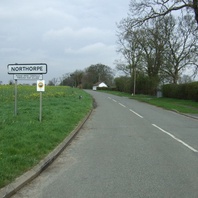
Viking Names
Northorpe
Northorpe, in the West Riding of Lindsey of Lincolnshire was originally a simplex place-name from Old Norse þorp ‘outlying farm, settlement’. Old English norð ‘north, northern’ was prefixed to distinguish Northorpe from Southorpe, which is now a deserted medieval village.
Read More

Viking Names
Perlethorpe
Perlethorpe, in the Bassetlaw Wapentake of Nottinghamshire, was originally a simplex name from the Old Norse element þorp ‘outlying farm, settlement’. The first element derives from the family name Peverel and was added at a later date possibly because the estate became associated with this family. Perlethorpe is a joint parish with Budby.
Read More

Viking Names
Cadeby
Cadeby, in the North Riding of Lindsey of Lincolnshire, comes from the Old Norse male name Káti and Old Norse bý ‘a farmstead, a village’ Cadeby is a joint parish with Wyham.
Read More
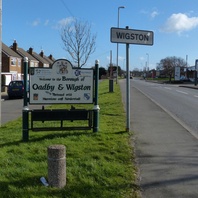
Viking Names
Wigston Magna
Wigston Magna, in the Guthlaxton Hundred of Leicestershire, is an Anglo-Scandinavian hybrid from the Old Norse male personal name Víkingr and the Old English element tun ‘an enclosure; a farmstead; a village; an estate’. Alternatively the first element might be the Old Norse appellative víkingr ‘a viking’, the probably source of the personal name. It has also been suggested that the first element may be the Old English male personal name Wicing or Old English wicing ‘a pirate, a viking’; however, these suggestions are doubtful because the length of the initial vowels of these elements are uncertain, therefore, the Old Norse male personal name is generally accepted as the first element. The Medieval Latin affix Magna ‘big, great’ arose when there was confusion between forms from Wigston Magna and Wigston Parva, which have different etymologies and development, around the the sixteenth century. Some forms of the name also have the affix with two steples because Wigston Magna possessed two medieval churches. Wigston Magna is also known as Wigston and is a joint parish with Oadby.
Read More
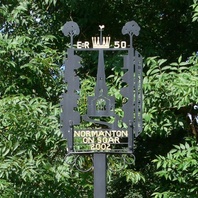
Viking Names
Normanton on Soar
Normanton on Soar, in the Rushcliffe Wapentake of Nottinghamshire, takes its name from the Old English ethnonym Norðman ‘Northman, Norwegian’ and the Old English element tun ‘farm, settlement’. There are several places of this name, predominantly in the East Midlands: five in Nottinghamshire, one each in Derbyshire, Leicestershire, Lincolnshire and Rutland, and one in the West Riding of Yorkshire. The affix Soar refers to the location of this Normanton on the River Soar. Traditionally, the place-name has been interpreted as referring to a settlement of Norwegians (in an area where most of the Scandinavian settlers were Danes). However, the exact implications of such a name are not yet fully understood and are the subject of ongoing work by Dr Jayne Carroll of the Institute for Name-Studies, University of Nottingham.
Read More
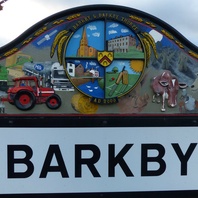
Viking Names
Barkby
Barkby, in the East Goscote Hundred of Leicestershire, is a Scandinavian compound from the Old Norse male personal name Bark, from either Barki (genitive singular Barka), or Barkr, Bǫrkr (genitive singular Barkar) combined with Old Norse by ‘a farmstead, a village’. A late form of the name, Mikeberkby, is prefixed by the Old Norse element mikill ‘great’ to distinguish it from its neighbouring daughter settlement Barkby Thorpe.
Read More
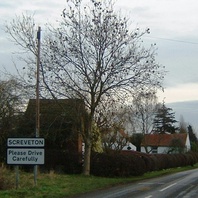
Viking Names
Screveton
Screveton, in the Bingham Wapentake of Nottinghamshire, is made up of two Old English elements, scir-gerefa ‘sheriff’ and tun ‘farm, settlement’. However, the modern pronunciation (as if ‘sk-‘) is due to the influence of Scandinavian-speakers. Old English words beginning in sc- (usually sh- in Modern English, like ‘ship’) often have Scandinavian equivalents spelled (and pronounced) sk- (like Old Norse skip and Modern Danish skib for the same thing). Many modern English words beginning in sk- derive from Old Norse.
Read More
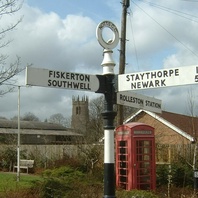
Viking Names
Fiskerton
Fiskerton, in the Thurgarton Wapentake of Nottinghamshire, is from the Old English elements fiscere ‘fisher’ and tun ‘farm, settlement’. The pronunciation has however been influenced by Scandinavian-speakers (compare Old Norse fiskari with the same meaning). There is also a Fiskerton in Lincolnshire, which has undergone the same process.
Read More
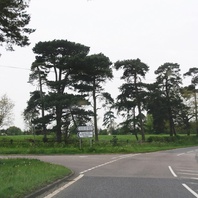
Viking Names
Toynton All Saints
Toynton All Saints, in the Bolingbroke Wapentake of Lincolnshire, is probably ‘the farmstead, village associated with or called after Tota’, from the Old English male personal name Tota with the Old English medial connective particle -ing and Old English element tun ‘farm, settlement’. Alternatively, the first element could be Old English tot ‘a look-out’. Thus, ‘farm/settlement at *Toting (= the look-out place)’. The affix is from the dedication of the church.
